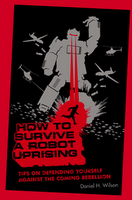 There was a short story in the June Wired on the book How to Survive a Robot Uprising by Dave Wilson. Having seen all the Terminator and Matrix flicks, the concept of a how-to guide on fighting off the inevitable robot take-over amused me.
There was a short story in the June Wired on the book How to Survive a Robot Uprising by Dave Wilson. Having seen all the Terminator and Matrix flicks, the concept of a how-to guide on fighting off the inevitable robot take-over amused me.Then I saw the story below in the Chicago Tribune. I might have watched a few too many X Files episodes in my time, but doesn't the idea of our government developing these types of technologies give you the creeps?
Even assuming that our military industrial complex is benign and altruistic, which is something I personally have severe doubts on, what's the likelihood of the technologies falling into less friendly hands? Don't we have a pretty spotty record of supplying questionable regimes with military technology that then gets used against us? And then there's the premise we started out with: What if these death robots do gain consciousness and think they can run the world better than us? Given the way things have been going, I won't be in a position to argue with them.
U.S. military is robo-savvy
Mark Jacob, Tribune staff reporter
TSUKUBA, Japan -- Robots killed at least 14 people in Pakistan last January.
The mechanical attackers were airborne Predator drones, operated by remote control by the CIA. They fired Hellfire missiles at the village of Damadola in an unsuccessful attempt to kill the No. 2 Al Qaeda leader, Ayman al-Zawahiri.
The U.S. military and intelligence services are on a constant lookout for such technology.
The Defense Advanced Research Projects Agency, for example, is awarding contracts to develop mini-aircraft--about the size of birds or insects--to carry sensors or cameras to sensitive areas. Another avenue of exploration is "automated target recognition software" that would not only determine targets but might also someday make decisions to fire, based on human programming.
While some people express alarm at robotics and other technology being channeled into the military, others say the effort keeps Americans safe and provides spinoff benefits for consumers. For example, DARPA helped develop the Internet.
Many Japanese roboticists, sensitive to the disastrous effects of their nation's past warmaking, shy away from military applications. But the Japanese Defense Agency budgeted about $570,000 for robotics in fiscal 2006.
At Tsukuba University outside Tokyo, researcher Yoshiyuki Sankai said he was approached after the Sept. 11 attacks by the U.S. Defense Department and invited to participate in a military project. Sankai has developed a robot suit designed to increase the effective strength of disabled people.
DARPA's Walker could not confirm Sankai's account, noting that her agency isn't the only one conducting defense research.
But she did note that Sankai attended a November 2001 workshop in Washington related to a DARPA project called Exoskeletons for Human Performance Augmentation, which is an effort to build wearable devices to "increase the speed, strength and endurance of soldiers in combat environments."
Sankai said he refused to get involved in Pentagon research, explaining, "In Japan, military application means evil."
No comments:
Post a Comment